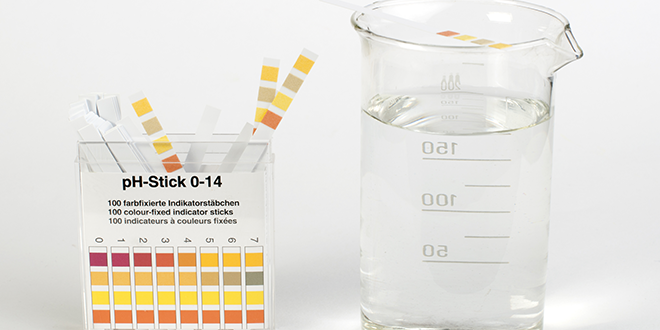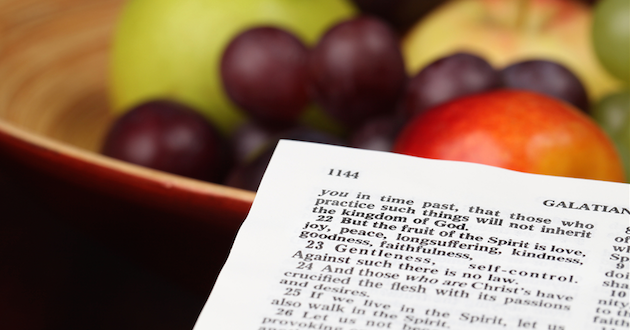Why should you drink alkaline water? The answer is complex, but we’ll explain the key components here (and offer a very simple way to get it in your hands—without buying expensive pre-packaged bottles or gadgets).
First things first:
What we mean when we say “alkaline water”
The Key Difference Between “Alkaline” and “Alkalinity” and Why This Matters to Your Health
This concept is widely misunderstood, yet when it comes to drinking water it’s one of the most imperative.
To be in great health, our bodies need to be a touch alkaline, with a pH between about 7.3 and 7.45. (Note the pH scale ranges from 1 to 14—7 is neutral, anything lower is acidic and anything higher is alkaline.)
The problem is, with the Standard American Diet (SAD), our bodies become acidic with foods like dairy, sugar, coffee and meat. This unbalanced acidity causes major health issues like inflammation, digestive problems and disease. Even if you’re not on the SAD and eating mostly raw, plant-based foods (good for you!), you can’t just drink any water for maximum health. Here’s why:
To help neutralize the acidity, you need to consume water with high alkalinity—not necessarily water with just a high pH (alkaline). The difference lies here: The pH is simply the measurement of how alkaline a substance is. On the other hand, alkalinity is the water’s ability to withstand changes in pH levels, preventing it from becoming more acidic. This is called the “buffering capacity.”
It is this buffering capacity that we need to measure when we consider drinking water because it is what tackles acidity.
It is definitely possible for water to have a high (alkaline) pH and no alkalinity. Even when the water’s pH is high, it is impossible for the water to neutralize any acid without high alkalinity. Take certain foods, for example. Lemon juice and apple cider vinegar both are acidic on the pH scale, but they possess high alkalinity and therefore can effect change in an acidic environment.
The Benefits of Alkaline Water
The most significant benefit of alkaline water is that it helps neutralize the acidity in your body. Not only that, but alkaline water is also known to lower the disease-causing free radical damage in your body and add minerals to it. To demonstrate the power of alkaline water,
this study concluded that unlike other types of water, alkaline water possesses an “acid-buffering capacity,” making it a great choice for those who suffer from acid reflux disease.
Before we get into how you can easily incorporate alkaline water into your day-to-day consumption, let’s talk about water, why you need it and how it works in your body—and how that all fits in with alkaline water.
Water is not only vital for mere existence, but it is also essential for optimum health. An insufficient amount of water causes weakness, problematic skin, a weakened immune system—virtually every health issue under the sun requires water as part of the “healing squad.” This is why humans can live for up to 40 days without solid food, but just up to four days without water.
Our body’s are primarily made up of water (around 60% for an adult and 74% for a baby). Since we lose water every day from natural mechanisms such as breathing or perspiration, we need to replenish our bodies’ supply of water so every living cell can thrive.
What role does water play in our bodies?
The University of Rochester Medical Center elucidates: “
helps carry nutrients to all the cells in your body. It helps carry waste products from the cells. It is a part of essential reactions within the body. It helps regulate body temperature by absorbing heat generated by your metabolism and eliminating excess heat through sweating. It helps with digestion of food. It helps lubricate your joints.”
The thing is: Not all water is created equal. To properly counteract acidity in your body, you need water with high alkalinity.
So what type of water possesses high alkalinity?
Below is a table demonstrating the alkalinity in various types of water:
Table 1: Alkalinity of Purified Bottled Water
| Water Sample |
Total Dissolved Solids |
Alkalinity† |
| Aquafina |
3.9 |
0.1 |
| Dasani |
30.6 |
0.1 |
| Distilled, brand 1 |
2.1 |
0.07 |
| Distilled, brand 2 |
1.2 |
0.06 |
| Earth H2O Plus |
58.3 |
0.233 |
| HydroBoost |
270 |
0.29 |
| Smart Water |
34.9 |
0.18 |
† Alkalinity is measured as the amount of acid (moles of HCl) required to lower the pH of 1 liter of water to pH 4.3.
As seen in Table 1, many purified bottled waters have very little alkalinity. They do little better than distilled water. Based on this concept of alkalinity, The Hallelujah Diet recommends adding HydroBoost to distilled water.
Why?
To get truly pure drinking water, the original water source needs to be completely void of chlorine or chloramine, fluoride, arsenic, lead, industrial organic pollutants, pharmaceutical residues, viruses and bacteria, and rock minerals.
There isn’t a single method that gets rid of all of these substances, but to date, the best water to drink is distilled water.
But there’s a potential issue with distilled water…
Our Research Director Dr. Michael Donaldson explains: “There are some potential adverse effects of drinking distilled water. It does pull a small amount of minerals from the body. For most people, this may not be a problem. For a person with marginal mineral intake, this could lead to long-term negative health effects. For people interested in long-term optimal health, losing a small amount of minerals from the body might be a concern as well.”
On top of that, distilled water, as well as most other purified water, typically have an acidic pH.
 So how can you address the issues of distilled water?
Dr. Donaldson says: “The best solution is to add a concentrated solution that remineralizes, alkalizes the water and reduces the surface tension.”
A Kangen water machine takes tap water and purifies it, alkalizes it, makes it more hydrating and ups its antioxidant value. However, not everyone has a Kangen machine or easy access to it, and it can cost up to thousands of dollars.
As an alternative, The Hallelujah Diet created HydroBoost, which instantly transforms your water by alkalizing it, providing essential minerals in amounts and forms that benefit the body and improves the hydrating ability of your water.
All you need to do is add it to distilled or reverse osmosis water.
How can HydroBoost improve your water?
So how can you address the issues of distilled water?
Dr. Donaldson says: “The best solution is to add a concentrated solution that remineralizes, alkalizes the water and reduces the surface tension.”
A Kangen water machine takes tap water and purifies it, alkalizes it, makes it more hydrating and ups its antioxidant value. However, not everyone has a Kangen machine or easy access to it, and it can cost up to thousands of dollars.
As an alternative, The Hallelujah Diet created HydroBoost, which instantly transforms your water by alkalizing it, providing essential minerals in amounts and forms that benefit the body and improves the hydrating ability of your water.
All you need to do is add it to distilled or reverse osmosis water.
How can HydroBoost improve your water?
- HydroBoost significantly improves the mineral content. Distilled water has approximately 0.90 ppm; HydroBoost has approximately 250 ppm.
- HydroBoost raises the pH of distilled and reverse osmosis water to an alkaline level of 8.0 or higher. This is not too alkaline for long-term health, as it comes from very bioavailable calcium and magnesium ionic salts.
- HydroBoost also reduces the surface tension of the water, improving the water’s ability to hydrate thirsty body tissues.
- HydroBoost supplies alkalinity to counteract the acidity of the body.
Another good solution is to squeeze some fresh lemon juice into a glass of water. This will remineralize the water and add some alkaline minerals to it as well, along with a great taste.
Getting Water From Your Diet
 We’d be remiss if we didn’t advise you to eat raw vegetables—they contains loads of water! According to the Institute of Medicine, 20% of your water intake comes from food sources. Below are the vegetables with the highest water content:
We’d be remiss if we didn’t advise you to eat raw vegetables—they contains loads of water! According to the Institute of Medicine, 20% of your water intake comes from food sources. Below are the vegetables with the highest water content:
- 96%*: cucumber, lettuce
- 95%*: zucchini, celery, radish
- 94%*: tomato
- 93%*: green cabbage
- 92%*: cauliflower, red cabbage, eggplant and spinach
- 91%*: broccoli (by weight)
- 87%*: carrots
*percentage of water content
In Summary
You can replace a carrot with broccoli to suit your personal tastes, but there is no substitute for water. You need water to live vibrantly, but make sure the water you drink flows in synergy with your body by choosing water with high alkalinity. Eat lots of raw vegetables and choose to enhance your distilled water with HydroBoost for a surge of hydration, health-enhancing minerals and acid-quenching alkalinity.
Find out why Distilled Water is the best.
 So how can you address the issues of distilled water?
Dr. Donaldson says: “The best solution is to add a concentrated solution that remineralizes, alkalizes the water and reduces the surface tension.”
A Kangen water machine takes tap water and purifies it, alkalizes it, makes it more hydrating and ups its antioxidant value. However, not everyone has a Kangen machine or easy access to it, and it can cost up to thousands of dollars.
As an alternative, The Hallelujah Diet created HydroBoost, which instantly transforms your water by alkalizing it, providing essential minerals in amounts and forms that benefit the body and improves the hydrating ability of your water.
All you need to do is add it to distilled or reverse osmosis water.
How can HydroBoost improve your water?
So how can you address the issues of distilled water?
Dr. Donaldson says: “The best solution is to add a concentrated solution that remineralizes, alkalizes the water and reduces the surface tension.”
A Kangen water machine takes tap water and purifies it, alkalizes it, makes it more hydrating and ups its antioxidant value. However, not everyone has a Kangen machine or easy access to it, and it can cost up to thousands of dollars.
As an alternative, The Hallelujah Diet created HydroBoost, which instantly transforms your water by alkalizing it, providing essential minerals in amounts and forms that benefit the body and improves the hydrating ability of your water.
All you need to do is add it to distilled or reverse osmosis water.
How can HydroBoost improve your water?
 We’d be remiss if we didn’t advise you to eat raw vegetables—they contains loads of water! According to the Institute of Medicine, 20% of your water intake comes from food sources. Below are the vegetables with the highest water content:
We’d be remiss if we didn’t advise you to eat raw vegetables—they contains loads of water! According to the Institute of Medicine, 20% of your water intake comes from food sources. Below are the vegetables with the highest water content:
 So how can you address the issues of distilled water?
Dr. Donaldson says: “The best solution is to add a concentrated solution that remineralizes, alkalizes the water and reduces the surface tension.”
A Kangen water machine takes tap water and purifies it, alkalizes it, makes it more hydrating and ups its antioxidant value. However, not everyone has a Kangen machine or easy access to it, and it can cost up to thousands of dollars.
As an alternative, The Hallelujah Diet created HydroBoost, which instantly transforms your water by alkalizing it, providing essential minerals in amounts and forms that benefit the body and improves the hydrating ability of your water.
All you need to do is add it to distilled or reverse osmosis water.
How can HydroBoost improve your water?
So how can you address the issues of distilled water?
Dr. Donaldson says: “The best solution is to add a concentrated solution that remineralizes, alkalizes the water and reduces the surface tension.”
A Kangen water machine takes tap water and purifies it, alkalizes it, makes it more hydrating and ups its antioxidant value. However, not everyone has a Kangen machine or easy access to it, and it can cost up to thousands of dollars.
As an alternative, The Hallelujah Diet created HydroBoost, which instantly transforms your water by alkalizing it, providing essential minerals in amounts and forms that benefit the body and improves the hydrating ability of your water.
All you need to do is add it to distilled or reverse osmosis water.
How can HydroBoost improve your water?
 We’d be remiss if we didn’t advise you to eat raw vegetables—they contains loads of water! According to the Institute of Medicine, 20% of your water intake comes from food sources. Below are the vegetables with the highest water content:
We’d be remiss if we didn’t advise you to eat raw vegetables—they contains loads of water! According to the Institute of Medicine, 20% of your water intake comes from food sources. Below are the vegetables with the highest water content:







